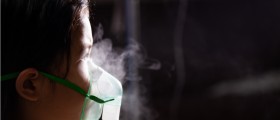
Bacterial Bronchitis Overview
Bronchitis is a respiratory disease characterized byinflammation of membranes of bronchi. Bronchitis can be caused by virus orbacteria. It may be result of other pathogens as well such as dust andallergens. Bacterial bronchitis is less common than viral bronchitis but it is moresevere. Bronchitis in humans can be caused by bacteria such as mycoplasmapneumoniae, streptococcus, bordatella pertussis, chlamydophila pneumoniae. Symptomsof bacterial and viral bronchitis are almost the same so it is hard to see thedifference. Only a physician can give an absolute diagnosis. Also, bronchitiscan be acute or chronic depending on the duration and frequency of bronchitis bouts.Acute bronchitis commonly results from viral infection but in rare cases it maybe caused by bacteria. Bacterial bronchitis is not as contagious as viralbronchitis but anyway you should avoid any contact with person suffering frombronchitis. Bronchitis is especially infectious during the first week whensymptoms of the condition are noticeable.
Causes of Bacterial Bronchitis
Any respiratory disease is most commonly caused by poorimmune system as it is seen in patients suffering from HIV/AIDS or lupus.Chronic bronchitis can be caused by untreated common cold or flu. Increasedrisks of developing bronchitis have people with acid reflux disease or any typeof respiratory disease. Bacterial bronchitis can result from continuous exposureto environmental pollutants such as tobacco and industrial smoke. Peoplesuffering from allergies to seasonal pollen, dust and pet dander are moresusceptible to bacterial bronchitis.
Symptoms of Bacterial Bronchitis
Each individual may differently experience bacterialbronchitis. Symptoms of this respiratory condition can resemble other medicalproblems caused by bacterial infection. The most common signs and symptoms ofbacterial bronchitis include: runny nose, malaise, chills, slight fever, backand muscle pain, sore throat, hoarseness, wheezing, drowsiness, initially dry,non-productive cough, and later yellowish mucus-filled cough.
Diagnosis and Treatment for Bacterial Bronchitis
If you notice mentioned symptoms present longer than fewdays, seek medical attention. Bacterial bronchitis can be diagnosed bycompleting physical examination and medical history. Tests used to confirmdiagnosis include chest X-rays, blood tests, cultures of nasal discharge, pulseoximetry and pulmonary function test. Bacterial bronchitis is commonly treatedwith antibiotics but other medications can be given as well to relieve fever,cough and other symptoms of the condition. It is important to take prescribedmedications regularly for period of time as ordered by a doctor since acutebronchitis may lead to chronic if left untreated. Additionally, avoid spendingtime in rooms with cold and dry air and increase fluid intake.

















Your thoughts on this
Loading...